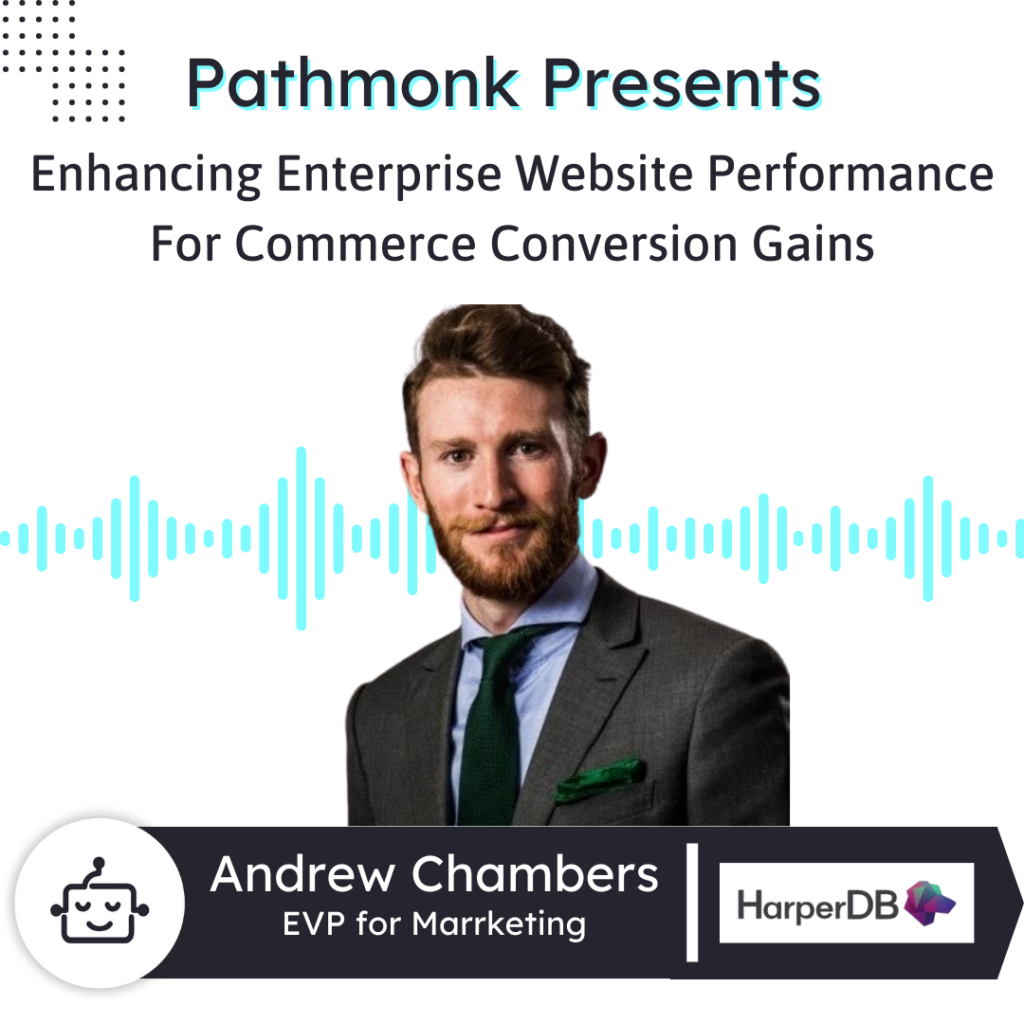
Introduction
In this episode of Pathmonk Presents, Drew Chambers, EVP of Marketing at Harper, breaks down how leading digital commerce brands boost performance and conversions through Harper’s distributed application platform.
He explains how combining database caching, messaging, and API layers at the edge creates faster, more seamless user experiences—critical for teams competing in high-traffic, high-stakes environments.
Drew also shares how enterprise marketers and engineering leaders leverage performance improvements to strengthen SEO, improve checkout flows, and drive more revenue from existing traffic. He highlights their strongest acquisition channels, including syndicated content, webinars, and channel partnerships, offering practical insight for teams focused on measurable growth.
Increase +180%
leads
demos
sales
bookings
from your website with AI
Get more conversions from your existing website traffic delivering personalized experiences.

Rick: Pathmonk is the AI for website conversions. With increasing online competition, over 98% of website visitors don’t convert. The ability to successfully show your value proposition and support visitors in the buying journey separates you from the competition online. Pathmonk qualifies and converts leads on your website by figuring out where they are in the buying journey and influencing them in key decision moments with relevant micro experiences like case studies, intro videos, and much more. Stay relevant to your visitors and increase conversions by 50% by adding Pathmonk to your website in seconds. Letting the AI do all the work and increase conversions while you keep doing marketing as usual. Check us out on Pathmonk.com. Alright everyone, welcome to today’s episode of Pathmonk Presents. Today we are joined by Drew Chambers. He is the EVP of Marketing at Harper. Drew, welcome to the show.
Andrew Chambers: Thanks for having me, Rick.
Rick: Of course. Excited to get into it. Drew, maybe let’s start with the basics. Can you tell us a little bit about the big idea behind Harper and, if you were to explain it to a friend over coffee, how would you describe what you do on a daily basis?
Andrew Chambers: Yeah. It’s interesting because I’m the least technical person at my company, so I’m often asked this question by friends. What I say is very simply, we make applications and websites faster and more performant. Harper is, at its core, a distributed application platform, or a platform as a service, that combines a number of core functionalities. So database caching, messaging, application API layers, all in one in-memory process. You can globally distribute and run a mesh of essentially those at the edge and make your application and your website faster, more user friendly, and create a better experience for your customer. And really, the people that we work with are the largest digital commerce brands in the world. We’re talking about massive product catalogs, millions upon millions of visitors a month, and this stuff really matters. So that’s, at its core, what Harper does.
Rick: All right. Okay. And I was going to ask, and you touched on it briefly, the type of business you guys work with. It sounds like it’s more on the enterprise side. The more traffic they have and the more resource-heavy their platforms or websites are, the better for you guys because you can help them out with that. Am I getting that right?
Andrew Chambers: Yeah. I think the value proposition for the largest digital commerce players is magnified because every single millisecond matters. If you’re competing against other behemoths, you want to get those marginal gains. Certainly small and medium sized businesses could find advantages in what Harper does, but it’s not typically who we talk to. We’re talking to large development teams, engineers, and large marketing teams that are really trying to say, okay, we know that Google and ChatGPT and all of these different methods of acquiring traffic require that we have a really good site experience for our users. What are things that we can do to improve Core Web Vitals, to improve the speed and performance of our website, to improve the checkout process and make it quicker and more seamless for the user? That’s where Harper really shines.
Rick: Got it. Yeah, it’s paramount for those kinds of companies to have, as you said, those marginal gains, that edge, especially when it comes to search. It’s a cascade of factors that play into them showing up first place, second place. That makes a lot of difference, right?
Andrew Chambers: Yeah. Think about your own behavior. If you’re searching for a yoga mat, you’re not going to look at the ninth spot for the most part. You’re going to look at what are the top two and probably not going to scroll. I’m going to click on that shopping tile at the top of the results page. So that really matters. Google has shared most of the factors that go into how they select what goes into that first spot. It’s relevancy, it’s speed, it’s LCP, it’s INP, it’s CLS, it’s how relevant is the landing page experience, how likely is somebody to convert after they’ve clicked on that product tile. All of those things factor in. If you’re a team that’s basically saying, hey, we need to get more conversions with the same amount of traffic, we need to make our budget go further, CPMs are increasing, so what can we do to ensure that we’re comping against last year and doing better, you start to think about all of the technical components of your backend and what can be improved.
Rick: Yeah, that makes sense. And you guys help with that side of things. To stay on topic, how do you, on the receiving end of that search, get discovered by people, by your ICP, if you want to keep the marketing lingo, and maybe expand on the marketing channels that have become your go to for bringing in customers based on performance so far?
Andrew Chambers: Yeah, it’s a great question. We do a lot of the traditional stuff, paid media and trying to improve our organic discoverability through content creation and whatnot. I would say the best source of leads for us to date has really been through syndicated content. So highly relevant, outcomes story-driven content that’s basically saying, here’s what one large retailer did to prepare for Black Friday and Cyber Monday, here’s what they saw in terms of traffic lift, improvement in SERP, improvement in organic traffic, conversion rates, all the things they would be looking at from a KPI perspective. Putting those in trusted third party resources for the people that we talk to, which is, in general, leadership of the marketing team and leadership of the development and engineering team. It’s a technical team and it’s a marketing team coming together and saying, okay, how did these two things work together, what can I do technically to improve my SEO and my paid media efficacy, and what kind of budget do I have to outline for that type of effort? So syndicated content has been really powerful.
Lead gen paid ads, I think, is probably the case for most of your audience. If you have the right message, something that’s really targeted, the right landing page experience, those tend to perform really well. We have a lot of technical webinars and workshops and knowledge transfer that we do on an ongoing basis that also does really well. And then really the two largest drivers for us are existing customer base and channel partners. We work very closely with large CDNs to provide our solution on top of what they can provide. That’s a huge entry point for us with some of the clients that we talk to. All of those, in various allotments, are the secret recipe for us.
Rick: Okay, that’s interesting. Syndicated content, webinars. You already touched on something I really want to follow up with. You have a lot of experience in marketing. From that experience, working at Harper or in past roles, what do you think actually makes a website convert? It can be tools, tactics, frameworks, anything you’ve seen that really works. Is there anything you can share with our audience?
Andrew Chambers: For sure. I think there’s a lot that goes into having a really successful website. To take a step back, the most successful websites and brands that I’ve worked with have always done a tremendous amount of work to build community and understanding around their brand and product. Without that, you could have the best website in the world and you’re not going to convert at the same rate as another company that maybe has a lesser quality website but has put tons of effort into building that evangelist community of people that are shouting about your product from the rooftops. That’s always going to be your most powerful tool. It’s why so many brands are doing influencers now. I think consumers have started to catch on and have gotten a lot more savvy about it, especially with AI, but it still is paramount.
The thing I talk about with my team and in my past life when I worked with lots of brands is: think about the last time you had a truly positive buying experience in real life, a human-to-human interaction. Think about all the elements that went into that. You were probably talking to a salesperson or the owner of the store. They were nice but they weren’t pushy. They weren’t following you around, but they were answering your questions. They had all of the relevant information. Maybe they had a little anecdote. They told you that this product is the only one you could find in town because they had gone to some island and procured whatever it was. You had a story interaction that moved you from “I’ve discovered and I’m interested” to “I’m going to purchase this today.” The best websites and companies today are able to translate that into a digital experience.
Think about all the elements of your website. Case studies, a helpful chatbot, a seamless checkout experience. All those things need to be present in your online experience. I don’t want fifteen popups on my page. I don’t want to be clicking out of things. That’s the noisy salesperson tracking me around and I’m like, I have to get out of here. The product description isn’t two lines. It’s a real description and maybe a little story about how I might wear this or where I might wear it. I can see this on myself. I can take it that extra step, like in a real life experience. Then the checkout is seamless. I’m ready, I put in my info, you’ve got Apple Pay, Google Pay, Shop Pay, everything ready to go, and I don’t have a second to think twice. I’ve made the purchase. The closer you can get to that, the more successful your website is going to be.
So really it’s two pieces. Build the community, build the story around what you’ve created, and get people converting even if your website was built on Windows 95. Then do all the legwork to make an experience that feels as close to being in a pop-up shop as possible.
Rick: Yeah, you touched on something very important. Telling the story. I don’t think there are many websites and brands out there that do it, and it shows in performance and revenue. The story makes a difference. It’s what people remember. It’s that salesperson at the local shop that gives you that experience.
Andrew Chambers: Yeah, and it’s got to feel genuine. We’re in an era where being genuine matters. So many brands have caught on to what I was just saying and then they tell a story they made up. It comes off as hollow. If you don’t have that story, if you’re a bunch of venture capitalists that came together and decided there’s a space in the market and you’re going to make the best X, you don’t need to invent a grandmother story. Just be genuine. Say, look, nobody was doing this, we’re going to do it. Tell the real story. That comes across.
We live in an age where we’re bombarded by information and there’s a plethora of reviews. You can go to Reddit, you can go to whatever your relevant review website is, and you’re looking through a lens of disillusionment, trying to cut through what’s paid and what’s not, across everything from buying stocks to buying enterprise technology. Cutting through that by being genuine and real, those are the brands doing the best.
Rick: Be genuine, tell a real story. Got it. Let’s switch gears for a second. Let’s talk about you as a leader, Drew. What is the main focus you have on a daily basis, your typical workday, and what are the main things you focus on day to day to make it happen?
Andrew Chambers: A big part of my job is managing my team and helping my team be successful. We have a big belief at Harper around empathetic leadership and servant leadership. That comes from the top down from our CEO, Steven Goldberg. What that means is, what can I do, what blockages are happening for you that I can help with? Whether that’s being a sounding board, giving advice, or talking to another leader to unstick something in the process.
I also help my team prioritize what should be immediately in front of them. In marketing, there are a lot of things to get done and you have near term, medium term, and long term goals. Prioritizing those on a daily and weekly basis can be challenging. One thing I do with my team is think about what small goals we can accomplish this week where, at the end of the week, if we’ve completed those things, we’ve been successful. Those stack into medium term and long term goals. In marketing, wins can be sporadic, so finding points to celebrate small victories is really important.
Another big part of my job is working with other teams to determine strategy for new products and launches, how we message that to the market, what quantitative and qualitative research we’re using to inform that messaging, and what the rollout strategy looks like. What do I need from other teams, and how do we go from there.
Lastly, we’re an enterprise sales organization, so a big part of my job is making sure sales is successful. I meet regularly with the sales team and ask, what do you need, what are you missing, what are you hearing from end users that we can help with, so we can make better pathways or make their process more seamless?
Rick: That’s a really good point. I really enjoyed breaking down the big goal into manageable chunks and counting the small wins. It keeps it more manageable and you see on a weekly basis how you’re achieving the bigger goal.
Andrew Chambers: Yeah. It sounds silly, but a big part of being a good leader is keeping morale strong. How do you have strong morale? It’s having things to celebrate on a regular basis so the team feels momentum. We see momentum in sports all the time. A couple of good passes or close calls and suddenly a team feels it. The same thing works in our teams.
Rick: Momentum is another good one. Speaking of, we’re coming towards the end of the episode here. I want us to jump into our rapid fire segment, just a few questions to keep it light and engaging. Are you ready for that?
Andrew Chambers: Sure.
Rick: Do you prefer watching, reading, or listening when it comes to content? Okay, what’s the latest book or article, whatever piece of content you read, that you picked up, and were there any gems or ideas that stuck with you?
Andrew Chambers: That’s a good one. I read a piece of content just the other day about how much performance is becoming an important part of the conversion process for e-commerce brands. It was a really good study behind it. I’ll have to find it and maybe we can link it in the article, but it was very well done and to the point.
Rick: Alright, sounds good. If you had a magic wand and could fix one frustrating thing in your marketing life with tech, what would it be?
Andrew Chambers: Getting all the systems to talk to each other a little bit easier. We’re in Asana and Figma and Illustrator and all these things, and just getting them to connect is a big challenge. I guess that’s why Zapier exists, but it’s still hard.
Rick: You’re not the first to mention this, so someone out there is working on it. What’s one repetitive task that you’d love to put on autopilot forever?
Andrew Chambers: Oh man, these are good questions. Laundry. Is that an acceptable answer?
Rick: I think so. It doesn’t have to be strictly related to marketing or work. Laundry is a good one. Last one. If you could go back and give your past self a quick pep talk at the start of your journey, what advice would you drop?
Andrew Chambers: Have the ability to always take a step back. Sometimes we’re in moments that feel like this is it, the sky is falling, or if I don’t get this right, it all comes crumbling down. We all have moments in our career where we look back and think, wow, I blew that out of proportion, or that was not what I made it out to be. This isn’t to say don’t take things seriously or don’t put pressure on yourself to be the best you can be, but understand that these things generally aren’t as large of obstacles as we think. Especially early in your career, it feels like this is the one moment that will define you, and I’ve found that’s not the case. You have plenty of moments to define and redefine yourself. If you go in with openness and willingness to learn and make mistakes, you’re going to be a lot more successful.
Rick: I love that piece of wisdom. The way I’m hearing it is one word: grace. Have grace for yourself and it’ll be all right.
Andrew Chambers: Yeah, give yourself grace.
Rick: Very good. Drew, I want to thank you a lot for being on the show with us today. I also want to give you the last word. If someone forgets everything about the interview today, what is the one thing they should remember about your company?
Andrew Chambers: Performance. At the end of the day, that’s what we’re about. You’re working on a big project, you need something to be performant, you need it to be deployed at scale, that’s what Harper is about.
Rick: Love it. If someone wants to check you guys out, where can they go?
Andrew Chambers: At the airing of this podcast, there will probably be a redirect because we’re working on a new domain, but currently it’s harpersystems.dev and that will redirect to our new domain when this podcast comes out.
Rick: Exciting things to come. We talked about it offline a little bit, but I’m curious to see what’s going on there.
Andrew Chambers: Yeah, very exciting stuff. Thank you very much, Rick. I appreciate it.
Rick: Of course. Thank you, Drew. You have a great one.











